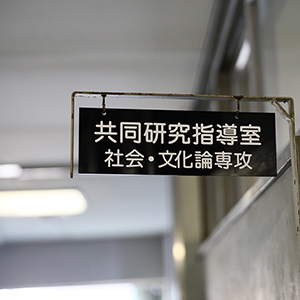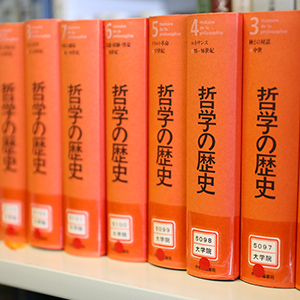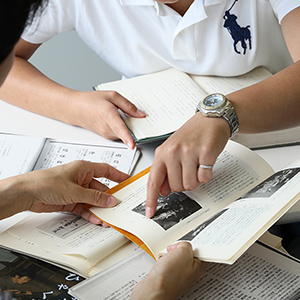Features of Socio-Cultural Studies Major
In the field of “Human Society”, seminars and special lectures on social system theories (sociology) are at the core. In the field of “Human Culture”, seminars and special lectures on culture theories (cultural anthropology and folkloristics), studies of culture thoughts (philosophy and religious studies), and studies of cultural representation (art and art history) are at the core. Basic theory on society and culture that is common to each specialization is required. We nurture experts who excel in domestic and foreign social surveys and fieldwork, as well as museum curators and journalists familiar with the field.
Curriculum
Master’s Program
Required Subjects
| Subjects | Number of Credits |
|---|---|
| Fundamental Aspects of Culture & Society I | 2 |
| Fundamental Aspects of Culture & Society II | 2 |
| Fundamental Aspects of Culture & Society III | 2 |
| Fundamental Aspects of Culture & Society IV | 2 |
Elective Required Subjects
| Fields | Subjects | Number of Credits |
|---|---|---|
| Human Society | Seminar on Social System Theories I | 8 |
| Seminar on Social System Theories II | 8 | |
| Special Lecture on Social System Theories I | 4 | |
| Special Lecture on Social System Theories II | 4 | |
| Human Culture | Seminar on Culture Structure I | 8 |
| Seminar on Culture Structure II | 8 | |
| Seminar on Culture Structure III | 8 | |
| Special Lecture on Culture Structure I | 4 | |
| Special Lecture on Culture Structure II | 4 | |
| Special Lecture on Culture Structure III | 4 | |
| Seminar on Cultural Thoughts I | 8 | |
| Seminar on Cultural Thoughts II | 8 | |
| Seminar on Cultural Thoughts III | 8 | |
| Special Lecture on Cultural Thoughts I | 4 | |
| Special Lecture on Cultural Thoughts II | 4 | |
| Special Lecture on Cultural Thoughts III | 4 | |
| Seminar on Cultural Representation I | 8 | |
| Seminar on Cultural Representation II | 8 | |
| Seminar on Cultural Representation Ⅲ | 8 | |
| Special Lecture on Cultural Representation I | 4 | |
| Special Lecture on Cultural Representation II | 4 | |
| Special Lecture on Cultural Representation Ⅲ | 4 |
Elective Subjects
| Subjects | Number of Credits |
|---|---|
| Advanced Readings in Social System Theories I | 2 |
| Advanced Readings in Social System Theories II | 2 |
| Advanced Readings in Culture Structure I | 2 |
| Advanced Readings in Culture Structure II | 2 |
| Advanced Readings in Cultural Thoughts I | 2 |
| Advanced Readings in Cultural Thoughts II | 2 |
| Advanced Readings in Cultural Representation I | 2 |
| Advanced Readings in Cultural Representation II | 2 |
| Advanced Readings in Cultural Representation Ⅲ | 2 |
| Studies on Modern Societies | 2 |
| Comparative Culture & Society | 2 |
| Culture Psychology | 2 |
| Psychology of Humanities | 2 |
| Applied Ethics | 2 |
| Lecture on Linguistic Culture | 2 |
| Studies on Cultural Values | 2 |
Process of Acquiring a Master’s Degree or PhD
Requirements for Applying for a Master’s Degree
- Period of Enrollment
You must be enrolled in the master's program for more than 2 years. - Credit Requirements
A total of 32 credits or more must be obtained for a predetermined subject.
Process to Apply for a Degree
-
Framework of Research Guidance
Graduate students affiliated with the department receive guidance on their thesis (master's thesis), including the establishment of a research theme and the preparation of a research plan, from their supervisor determined at the time of enrollment and several faculty staff in their field of specialization. Graduate students affiliated with the department conduct a series of research activities, acquire professional knowledge through the presentation of their "research theme," "thesis structure," and "thesis content," and submit a thesis (master's thesis) and apply for a master's degree. -
First year
April: Submit the "Research Plan".
June: 1st "Master's thesis review meeting": Presentation of the research topics.
November: 2nd "Master's thesis review meeting": Presentation of thesis structure. -
Second year
June: 3rd "Master's thesis review meeting": Presentation of the thesis content.
October: Submit the "Master's Thesis" proposal.
October: Supervision is also provided by the vice-chief supervisor approved at the regular committee meeting.
November: 4th "Master's thesis review meeting": Presentation of the thesis content.
January: Submit the master's thesis and present it at the master's thesis presentation.
February: Take the oral examination (final examination).
The above four master's thesis review meetings and master's thesis presentations will all be open to the public.
See other majors
- History Master's Program and Doctoral Program
- Japanese Language and Literature Master's Program and Doctoral Program
- English Language and Literature Master's Program and Doctoral Program
- German Language and Literature Master's Program and Doctoral Program
- French Language and Literature Master's Program and Doctoral Program
- Education and Clinical Psychology Master's Program and Doctoral Program



